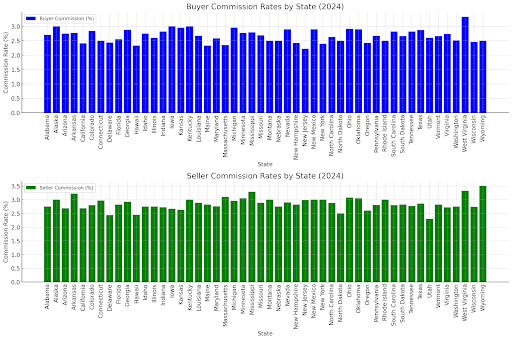How Real Estate Commission Works
Understanding how real estate commission works is essential for anyone involved in buying or selling property. Real estate commissions are often seen as a mystery, but they play a critical role in the smooth functioning of property transactions. Real estate commission is the primary way real estate agents earn their income.
Both buyers and sellers need to grasp how these commissions function to make informed decisions and ensure fair dealings. For instance, knowing what percentage of the sale price goes to the agent can help set realistic real estate commission and budget plans.
One reason this topic is vital is that it directly impacts the cost of buying or selling a home. Sellers must factor in the commission when pricing their property, while buyers should understand how it influences the overall cost.
A clear understanding prevents misunderstandings and fosters trust between clients and agents. Exploring how real estate agent commission works reveals how agents add value through services like pricing consultations, marketing, and negotiation. This knowledge empowers both parties to negotiate better deals with confidence.
Grasping these concepts ensures you are well-prepared for your next real estate transaction, whether you’re buying or selling.
What Is Real Estate Commission?
Real estate commission is a fee paid to real estate agents for their services in facilitating the sale or purchase of a property. It is usually calculated as a percentage of the property’s final sale price, making it the primary source of income for agents. Agents earn this commission by providing various services, including:
- Pricing consultation
- Marketing the property
- Negotiation between buyers and sellers
- Attending inspections and appraisals
The commission structure ensures that agents are motivated to achieve the best possible outcome for their clients. By understanding what real estate commission is, both buyers and sellers can better navigate their transactions with confidence. These commissions are often regulated by governing bodies to ensure fair practices in the industry. For instance, some regions may have specific guidelines and standards. These affiliations provide additional assurance to clients regarding an agent’s professionalism and compliance with industry standards.
How Do Real Estate Agents Earn Commission?
Real estate agents earn commission by successfully facilitating property transactions. Their primary role is to assist buyers and sellers in navigating the complex real estate market, ensuring that all legal and financial aspects of a deal are handled efficiently. The process involves several key steps:
- Listing the Property: For sellers, agents start by listing the property on relevant platforms, conducting market analysis to set a competitive price, and marketing the property to potential buyers.
- Marketing Efforts: Agents use various strategies such as online listings, open houses, and advertising to attract buyers. This helps in generating interest and leads.
- Negotiation: Once an offer is made, agents negotiate terms on behalf of their clients to ensure they get the best possible deal. This includes price, closing costs, and contingencies.
- Closing the Deal: After negotiations, agents assist in finalizing paperwork, coordinating inspections and appraisals, and ensuring that all contractual obligations are met.
Agents typically receive their commission only once a transaction is completed successfully. If the sale falls through or the home does not sell within the contract period, they may not get paid at all.
Understanding the Structure of Real Estate Commission
Real estate commission is typically a percentage of the property’s sale price. The average realtor commission in many markets ranges from 5% to 6%. However, this can vary:
- In competitive markets, commissions might be lower.
- In luxury markets, where properties are expensive, commissions might also be lower as a percentage but higher in absolute terms.
The commission structure usually involves splitting the total commission between the buyer’s agent and the listing agent. This split is often 50/50, though it can vary based on agreements. For example:
- A 6% total commission might be split into 3% for the buyer’s agent and 3% for the listing agent.
- Some deals may have an uneven split, such as a 4% to 2% distribution.
Both agents work hard to close a deal, providing services like pricing consultation, marketing, negotiation, and attending inspections and appraisals. Sometimes, brokers take a share of the agent’s commission. This broker-agent split depends on their contract and can be negotiated. Understanding these splits helps both buyers and sellers see where their money goes.
The table below details the real estate commission rates by state in 2024, including total commission rates, buyer commission rates, and seller commission rates. Additionally, graphical representations are provided to visualize these rates.
| State | Total Commission | Buyer Commission | Seller Commission |
| Alabama | 5.45 | 2.7 | 2.75 |
| Alaska | 6 | 3 | 3 |
| Arizona | 5.44 | 2.75 | 2.69 |
| Arkansas | 5.99 | 2.77 | 3.22 |
| California | 5.11 | 2.41 | 2.69 |
| Colorado | 5.63 | 2.83 | 2.8 |
| Connecticut | 5.47 | 2.5 | 2.97 |
| Delaware | 4.88 | 2.44 | 2.44 |
| Florida | 5.37 | 2.55 | 2.82 |
| Georgia | 5.81 | 2.88 | 2.93 |
| Hawaii | 4.78 | 2.33 | 2.45 |
| Idaho | 5.5 | 2.75 | 2.75 |
| Illinois | 5.35 | 2.6 | 2.75 |
| Indiana | 5.56 | 2.82 | 2.73 |
| Iowa | 5.67 | 3 | 2.67 |
| Kansas | 5.58 | 2.95 | 2.63 |
| Kentucky | 6 | 3 | 3 |
| Louisiana | 5.56 | 2.67 | 2.89 |
| Maine | 5.17 | 2.33 | 2.83 |
| Maryland | 5.34 | 2.58 | 2.76 |
| Massachusetts | 5.45 | 2.35 | 3.1 |
| Michigan | 5.92 | 2.96 | 2.96 |
| Minnesota | 5.82 | 2.77 | 3.05 |
| Mississippi | 6.07 | 2.79 | 3.29 |
| Missouri | 5.58 | 2.69 | 2.89 |
| Montana | 5.5 | 2.5 | 3 |
| Nebraska | 5.25 | 2.5 | 2.75 |
| Nevada | 5.8 | 2.9 | 2.9 |
| New Hampshire | 5.25 | 2.42 | 2.83 |
| New Jersey | 5.21 | 2.22 | 2.99 |
| New Mexico | 5.9 | 2.9 | 3 |
| New York | 5.39 | 2.39 | 3 |
| North Carolina | 5.52 | 2.63 | 2.88 |
| North Dakota | 5 | 2.5 | 2.5 |
| Ohio | 5.99 | 2.91 | 3.08 |
| Oklahoma | 5.95 | 2.9 | 3.05 |
| Oregon | 5.03 | 2.42 | 2.61 |
| Pennsylvania | 5.48 | 2.67 | 2.81 |
| Rhode Island | 5.5 | 2.5 | 3 |
| South Carolina | 5.62 | 2.82 | 2.8 |
| South Dakota | 5.49 | 2.66 | 2.83 |
| Tennessee | 5.58 | 2.82 | 2.77 |
| Texas | 5.73 | 2.87 | 2.86 |
| Utah | 4.9 | 2.6 | 2.3 |
| Vermont | 5.49 | 2.66 | 2.83 |
| Virginia | 5.45 | 2.73 | 2.72 |
| Washington | 5.25 | 2.51 | 2.75 |
| West Virginia | 6.67 | 3.33 | 3.33 |
| Wisconsin | 5.2 | 2.46 | 2.74 |
| Wyoming | 6 | 2.5 | 3.5 |
Key Factors Influencing Real Estate Commission
Several factors determine real estate commission. These elements help agents set their fees and can vary widely:
- Market Conditions: In a hot market where properties sell quickly, agents might lower their commission rates to stay competitive. Conversely, in a slow market, higher commissions may be necessary to attract skilled agents.
- Property Value: Higher-value properties often command higher commissions. This is because the work involved in selling an expensive property can be more complex and time-consuming.
- Location: Different regions have different standard commission rates. Urban areas might have different rates compared to rural ones due to varying demand and property values.
- Agent Experience: Experienced agents with a proven track record might charge higher commissions for their expertise and network.
Innovative pricing models are also emerging. Some firms, for instance, may offer unique fee structures designed to align closer with client needs, such as flat-fee services or performance-based commissions. These models aim to provide flexibility and transparency, ensuring clients only pay for the services they need. Understanding these factors helps buyers and sellers make informed decisions about choosing an agent and negotiating commission rates effectively.
Negotiating and Justifying Commission Rates
Tips for Clients: Negotiating Real Estate Commission
Negotiating commission rates in real estate can be a delicate task but can lead to significant savings. Here are some practical tips for clients:
- Understand Market Norms: Research common commission rates in your area. This gives you a baseline for negotiations.
- Highlight Your Property’s Appeal: If your property is highly desirable, agents might be willing to negotiate lower rates due to the higher likelihood of a quick sale.
- Compare Multiple Agents: Speak with several agents and compare their rates and services. This competition can lead to better deals.
- Ask for a Breakdown of Services: Understand what services are included in the commission. Knowing this helps you see where you might cut costs or ask for additional value.
Strategies for Agents: Justifying Commission Rates
From the agent’s perspective, justifying commission rates involves showcasing the value provided:
- Detailed Marketing Plans: Explain how your marketing strategies will make the property stand out, attracting more potential buyers.
- Professional Network Access: Highlight your connections with other industry professionals, such as inspectors and appraisers, which can streamline the transaction process.
- Experience and Expertise: Emphasize your track record and understanding of the local market. Experienced agents often secure better deals for their clients.
- Full-Service Offering: Outline all the services included in your fee, such as pricing consultation, professional photography, open houses, and negotiation expertise.
By clearly communicating these points, agents can help clients see the tangible benefits of paying the requested commission rate.
The Future of Real Estate Commission Models
Innovations in commission models are reshaping the real estate industry. New trends and technologies are offering alternative ways to handle commission structures:
- Digital Platforms: Companies use technology to streamline processes, reducing the need for traditional agents. This allows them to offer lower commission rates.
- Flat Fee Services: Some brokerages now offer flat fee services, charging a fixed amount regardless of the property’s price. This model can be more predictable and affordable for sellers.
- Commission Rebates: Buyers may receive a portion of the agent’s commission as a rebate, making home buying more attractive and affordable.
Emerging technologies like blockchain could further disrupt traditional models by enabling secure, transparent transactions without intermediaries. Virtual reality (VR) and augmented reality (AR) are also changing how properties are marketed and sold, potentially reducing the need for extensive agent involvement. The future of real estate commission models looks promising with these advancements, offering more options and greater value for both buyers and sellers.
Conclusion
Transparency and understanding in client-agent relationships are crucial when dealing with real estate commission. Both buyers and sellers benefit from clear communication and knowledge about how commissions work. Buyers and sellers should leverage the insights gained from this article to make well-informed decisions in their future real estate transactions. Recognizing the nuances of commission structures helps in negotiating better deals and appreciating the value provided by real estate agents.
Frequently Asked Questions
Real estate agents’ earnings vary widely based on location, experience, and market conditions. On average, real estate agents make between $40,000 to $100,000 annually, but top agents can earn much more.
The amount realtors make on a sale depends on the commission rate and the property’s sale price. Typically, realtors earn 5% to 6% of the sale price, which is then split between the buyer’s agent and the listing agent.
The average real estate commission is around 5% to 6% of the property’s sale price. This commission is usually split between the buyer’s agent and the listing agent.
Realtor fees are typically paid by the seller. The commission is deducted from the proceeds of the sale and then split between the buyer’s agent and the listing agent.
Real estate agents get paid through commissions, which are a percentage of the property’s sale price. They receive their commission once the transaction is successfully completed.
Real estate agents generally make a commission of 5% to 6% of the sale price of the property. This commission is usually split between the buyer’s agent and the listing agent.
Realtors typically charge a commission that ranges from 5% to 6% of the property’s sale price. This fee covers various services, including marketing, negotiations, and closing the deal.
Real estate commission is a fee paid to agents for their services in facilitating the sale or purchase of a property. It is usually a percentage of the sale price, split between the buyer’s agent and the listing agent, and is paid by the seller from the sale proceeds.
The average real estate agent makes between $40,000 and $100,000 per year, depending on factors such as location, experience, and market conditions. Top-performing agents can earn significantly more.

A Guide to Buying Distressed Homes: Opportunities in Real Estate
A Guide to Buying Distressed Homes: Opportunities in Real Estate The real estate market offers

Buying A House With Bad Credit: A Guide To Your Home Loan Options
Buying A House With Bad Credit: A Guide To Your Home Loan Options Buying a

Distressed Property: Everything You Need to Know
Distressed Property: Everything You Need to Know If you are searching for distressed properties for

Top Strategies for New Investors in Competitive Real Estate Markets
Top Strategies for New Investors in Competitive Real Estate Markets he world of real estate

The Role of Tech in Investment Real Estate: Trends in Digital Property Tools
The Role of Tech in Investment Real Estate: Trends in Digital Property Tools Introduction At

Buying a Home Close to Power Lines: What You Need to Know
Buying a Home Close to Power Lines: What You Need to Know Introduction When considering



